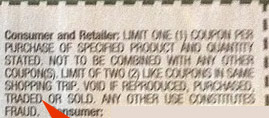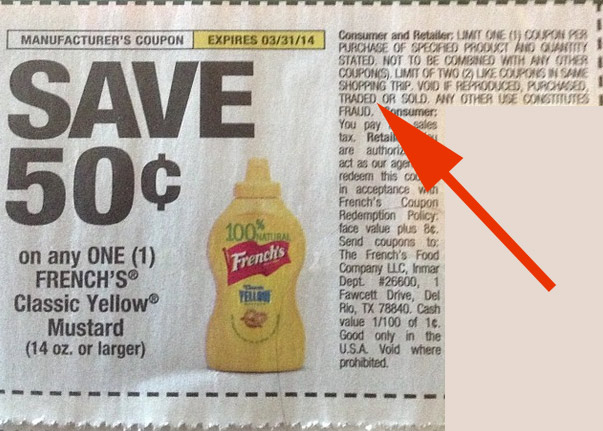One of my readers wrote today asking if I’d seen the wording on the new French’s mustard coupon that’s on the cover of the January 19th SmartSource coupon insert. It has a new restriction that I don’t believe we’ve seen before:

This wording is new, and as unusual as it seems, the manufacturer is stating that the coupon is void and has no value the minute it is traded to someone else. Ethically, if we wish to follow the rules, this coupon should not be traded.
Is this going to be nearly impossible to enforce? Of course. A manufacturer has no way of knowing if you cut this coupon and decide to give it to your mom. Or is that allowable as it’s technically a “gift” and not a trade?
A few years ago I tackled the issue of coupon restrictions in one of my syndicated columns. At that time, I reached out to several manufacturers asking for specifics regarding the wording “Void if transferred.” Only one manufacturer responded under the condition that I not use their name or brand, though I can tell you that this manufacturer makes a well-known brand of meat products.(Why the secrecy though? It made me wonder how consumers are supposed to interpret some of these terms if no one’s willing to go on the record to discuss them.)
Anyway, what the meat manufacturer stated to me was that “Void if Transferred” meant transferring the coupon to another medium — making a photocopy, or scanning it to transfer it into a digital form. They were concerned with three areas of issue, which I explained in my column:
One Vocalpoint mailing included five $10 coupons for a popular brand of skincare products. While the mailer’s printed instructions encouraged me to share the coupons with friends, each coupon contained the wording: “Void if transferred to any person, firm or group prior to store redemption.” Why would a manufacturer put this wording on coupons that it explicitly encouraged me to give away to other people?
Transferring a coupon, from a legal standpoint, refers to much more than simply handing one to a friend. The transfer manufacturers seek to prevent involves three areas: duplication, distribution and compensation. If I photocopy a coupon or I scan a coupon into my computer and then print my scan of the original coupon, I am transferring that coupon from one medium to another. This duplication is prohibited. And, if I took my (now illegally transferred) copies of the original coupon and started using them or sharing copies with friends, I would be distributing an illegally transferred coupon. And if I went one step further and decided to sell those (illegally transferred) copies of coupons, I would be receiving compensation for transferring them.While the wording seems loaded with consequence, it’s simply a statement by the manufacturer notifying consumers that it reserves the right to declare a coupon void if it determines that the coupon is circulating via fraudulent means.
Now, it seems many are manufacturers are equating “transferring” a coupon with “handing a coupon to someone else.”
While researching material for a follow-up column on this topic, I spoke with another manufacturer, who also wished to remain anonymous. This is an excerpt from their coupon redemption policy:
- Coupons are non-assignable
- Void if transferred from their original recipient to any other person, firm or group.
- Unauthorized distribution, collection, sale, auction, trade or assignment of its coupons is not permitted for any reason.
- Coupons are not to be used in swap boxes, taped to product, placed on hooks near products, gathered and distributed by any person or group for charitable fund-raising purposes, or otherwise used in any way except by a consumer purchasing the brand/size(s) indicated thereon with the face value of the coupon deducted from the retail selling price.
The question I posed to the brand was this: If the brand feels so strongly about coupons not being used by anyone other than the original recipient, why does it allow military commissaries to submit coupons for redemption which were obviously sent overseas from the USA?
The main source of coupons for military families stationed overseas are those gathered and mailed to them by people from the USA. If the manufacturer truly felt this way about no one redeeming coupons that they did not directly receive for themselves, why not cease paying redemption on coupons coming from military bases? It would seem pretty easy for them to do at the clearinghouse level, especially when manufacturers can already deny payment for other suspicions of coupon sale or transfer.
The manufacturer’s representative said, under condition of anonymity: “Can you imagine the backlash we’d face if we stopped redeeming those? It would seem un-American!”
So, at the manufacturer’s discretion, “Void if transferred from their original recipient to any other person” can be subjective.
(And please understand, I am not trying to attack the practice of sending coupons overseas at all — I’ve had a link to the Overseas Coupon Project on my blog since I launched in 2008. I was just extremely curious as to what a manufacturer’s answer would be to this question — especially with such a heavily worded redemption policy.)
Be careful out there, couponers. And don’t trade any French’s mustard coupons.











lulusaves says
Sad to say, in just a small batch of my coupons I found more of the same ‘void if traded’ wording; Finish $2.15 1/5?, Frank’s Redhot Sauce SS 1/19, Thomas’ muffins SS 1/19…so sad its come to this.
SouthernReverie says
Perhaps we should just stop reading the fine print! :)